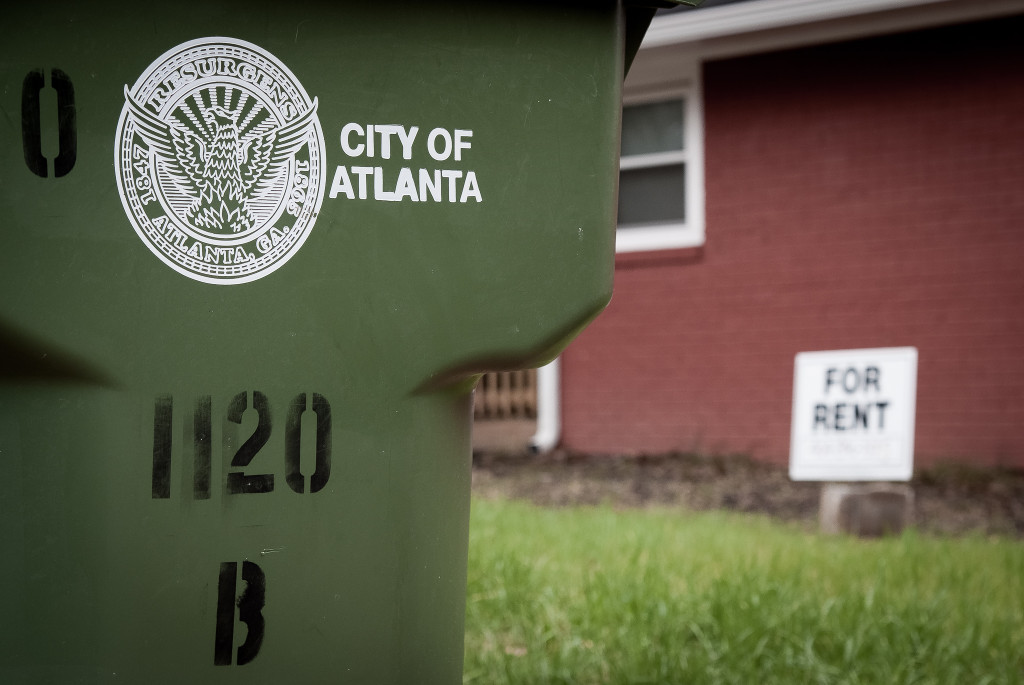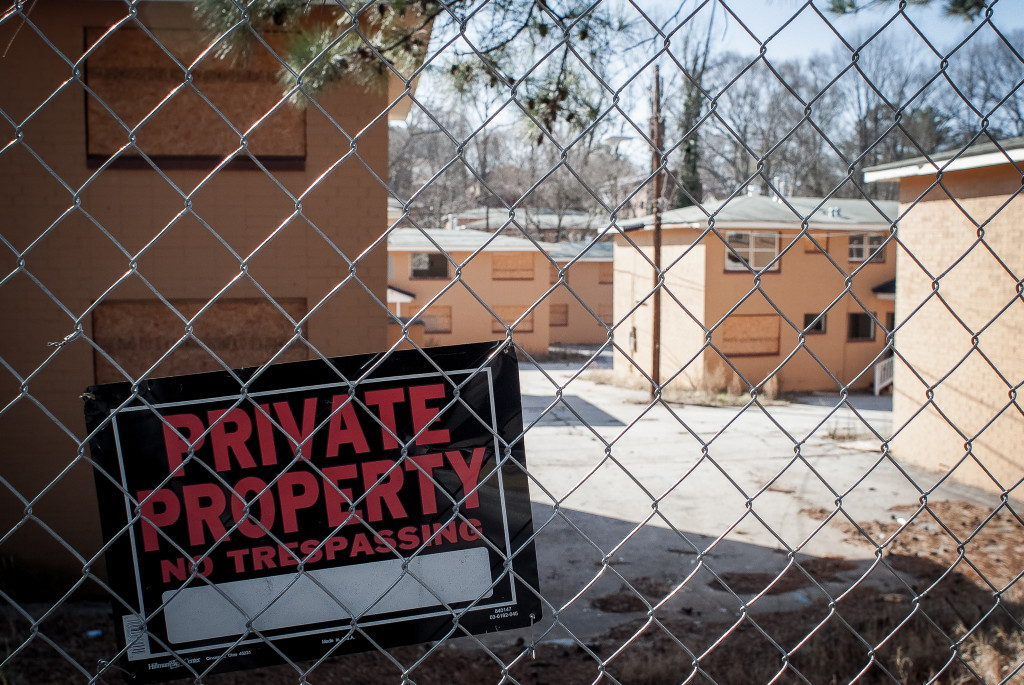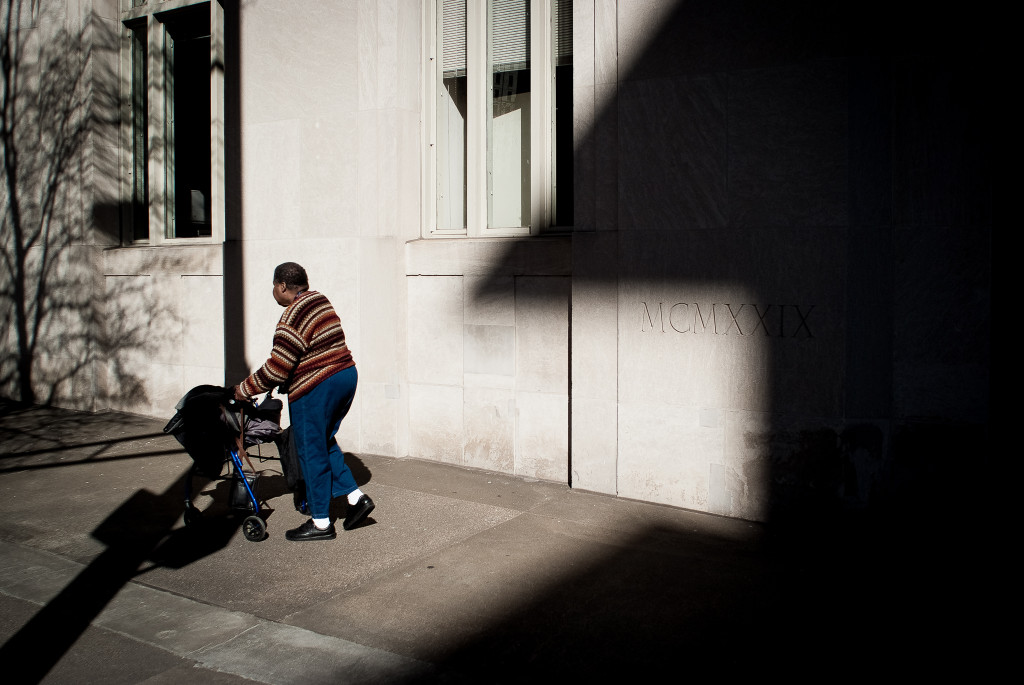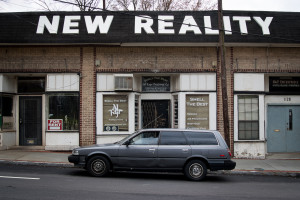It all started with a housing bubble. Six years on and counting, one of the biggest ironies of the 2008 financial crash is how hard it can be to remember it amid the other political and economic realities that have crowded in since. Gentrification is one of them. Its pace has only accelerated with the recovery—another irony—and not just in metropolises like New York but in cities across the United States.
King Williams is a filmmaker who splits his time between New York City and Atlanta, Georgia. In 2008,Williams began collaborating with students at Georgia State University and Savannah College of Art and Design to examine the effects of gentrification during the last days before public housing projects were demolished (in the hope that mixed-income communities could be built in their place). But as Atlanta underwent its own transformations, so did Williams’s documentary. By 2011, the production was on hiatus and the film’s fate uncertain. Now, The Atlanta Way has captured the attention of media outlets and celebrities alike. The film is nearing completion, with a tentative release set for this fall and the tag line: “There’s a right way, there’s a wrong way and then there’s The Atlanta Way.”
TBQ’s editor-in-chief Jane Carr sat down with Williams to discuss the upcoming film, housing policy in New York and Atlanta, Spike Lee, golf courses, and how where we live will affect us all in the decades ahead. Their conversation has been edited lightly for clarity.
Jane Carr: I’ve read that the idea for this film emerged from an urban policy class you took as a student at Georgia State in 2007. How did this come about, and why did you come to work with your current team? Why did you want to tell this story?
King Williams: Well, first of all, a special shout out to all my teachers at the Georgia State University. My teacher Tim Crimmins [Professor of History and Director of the Center for Neighborhood and Metropolitan Studies at Georgia State] wrote a lot of books on Atlanta. He had us do a paper on it, and I just thought it would be cool if we extended that and did a documentary. So I put a message on Facebook asking if anyone was around. We would go around finding people in different study halls, finding people who were interested, and that’s how we got started.
It seems social media has played a role not only in the film but also in the development of your career. Facebook was instrumental to the origin of the film. You’ve also been active on Twitter and that’s had an impact on the places you’ve gone.
Social media–wise, it was really good because we had a sense of how this was working in real time. We would post a photo and be like, “Hey, this is what we did today” and get feedback. It also helped me get launched in my career in 2011. Spike Lee joined Twitter in February 2011, and he didn’t really know what he was doing. He put up an accidental tweet asking people to contact his personal assistant Jason if they were looking for an internship. He posted Jason’s email address with the tweet. So I took a screenshot. I was in the Georgia State University computer lab with one of my friends, and she said “Hey, I think we can make this a campaign.” So March to April 2011 I launched a campaign to be Spike Lee’s intern. Eventually, after harassing Spike—not me directly but other people as well—I got the internship. And that parlayed what we we’re doing now.
What was that like?
It was like working for a really, really demanding football coach. He’s like, “I’m not you’re friend, this is what I expect you do to, be on time, pick up my shoes, my kids get picked up at 3…” So he’s like that, and that’s kind of how it goes.
Has that had any effect on how you have re-conceptualized the film as you moved forward after the 2011 hiatus? Or during that time was it kind of like, “I’m learning from Spike”?
Learning from Spike. From 2011 to 2012 I didn’t do anything other than work with Spike or work on other movies. I couldn’t really think about anything [else]. I had never been to New York in my life. I was there on my own just trying to find a place to stay every other night, and that was my world. So I came back home in 2012 and I saw the same things happening [there as] in Brooklyn.
In May, New York City Mayor Bill DeBlasio put out his affordable housing plan. It’s prompted a lot of controversy. What do you think of it?
I really like what he’s doing from what I saw of the plan. It is ambitious, and that says a lot, considering Atlanta is the poster child for ambitious projects. If he pulls off half of that, I will be amazed. That’s because you’re talking about a city that has a lot of zoning restrictions. There are nine million people here, so it’s not like there’s vacant space available. So it will be interesting to see how he actually re-does that.
Have you observed any pattern or had any particular ideas about the relationship between affordable housing and mass transit that aren’t talked about so much?
For Atlanta mass transit is a necessity that will not happen, just because of a lot of state things. Unlike in New York, the GOP really runs the neighborhood, and they’re very anti-transit. The problem for Atlanta is that most of our impoverished areas sit in areas we could easily build mass transit, but the government is like, “No, we don’t think it’s necessary.” It’s more of a culture thing.
A ‘par’ culture thing? A ‘privilege’ culture thing?
It’s both. There’s reason for it. Atlanta is basically a large suburb. It’s dominated a lot by suburban coalitions, voting coalitions, etc. For years and years these coalitions have been voting against mass transit. The stigma is people saying they don’t want black people or poor white people moving in or coming to their neighborhoods. And that’s been the issue. I think the thing that most people don’t see is that mass transit can be economically viable immediately. The Atlanta Airport sits directly in what people consider the more impoverished areas in the state, the south side of Atlanta. It’s a billion-dollar system, but they do a lot to employ people from that area who typically do not have a high school education, and they do a lot to make sure the areas around the airport are relatively viable. So I think it can work.
The other place where that worked well was Cape Cod, Massachusetts. I think New York would do really well by developing local business infrastructure that promotes jobs. If you have an issue getting to places, the next best thing you can do is build on infrastructure that’s already there.
Your Kickstarter campaign [ed. note: fully funded this May] and some of the press surrounding the film shows how you’re turning a spotlight on the successes and failures of Atlanta. What has made the city’s public housing projects different from some others that have different fates since 2008?
Well, East Lake Meadows got turned around. I’m actually from Decatur, which is very close by. Right around there is the famous East Lake Golf Club where Tiger Woods and Bobby Jones played. It was surrounded by all of this poverty—and people in Atlanta want to get there. The thing with East Lake Meadows was it was the first place to see: does this mixed-income housing model work? It did work. A lot of people like the argument that the reason the East Lake Meadows housing project worked was because they had to push out a lot of people that had drug offences. With East Lake Meadows, if the police came to your door two to three times, or if you had a child that got arrested, you didn’t get a voucher to come back. It was a strong weeding-out process. [But] everyone in Atlanta argues that they kept the people they wanted to keep but the majority didn’t stay. The housing waitlist for the vouchers was like 15,000 people and it’s closed. So they were like, of course the mixed income housing model works when you don’t have everyone coming back.
The film seems interested in getting beyond a story based just on crime statistics or policy reports in order to understand the real human experiences behind them. And I wonder if that’s how you see what you’re doing.
I look at it as a combination of the two. Because the data is there; the data shows [that] a lot of the housing policies work. The human-experience side of it—at least what I’ve seen growing up and what other people have offered—[is that] you are entering a very controlled situation that some people would argue is commercial real estate versus the public housing authority. They [commercial real estate interests] do stack the deck in their favor, and yes it’s cultural.
So I saw that when I went to New Orleans after Katrina, so that was kind of the same thing. A lot of people felt like you’re either attacking or misrepresenting [them]. The human-experience part of it is that everyone wants to be right and no one wants to be the bad guy. Only two people we interviewed didn’t care about being the bad guy. One of them was Diane Wright, and the other one we’re saving because it’s a nice little surprise.
That’s so often true of narratives people tell about American cities. You want to be a part of the right story, you don’t want to be the protagonist of the wrong story. Did you experience there similar moments in other cities you’ve worked like New Orleans, Memphis, Oakland, or Chicago?
Last year we visited a lot of those places. We’re doing a series [and] I’m going to go back to revisit [them]. We’re going to call it “Gentrifying.” It’s twelve cities—New Orleans; San Juan, Puerto Rico; Cape Cod; San Francisco; Brooklyn; northern New Jersey… It’ll be, “this is what we’ve seen in other cities, this is what we thought was interesting and familiar.” When people think about gentrification they think it is a polarizing thing, the main thing I thought was familiar in every one of those places was that essentially the residents all have a buy-in, but for completely different reasons. It’s very rare that 100% of the people actually buy into an idea, and that’s something that doesn’t get covered a lot.
So much of what you’re speaking about and exploring in the film has to do with displacement and migration and race. Is there more of a fraught landscape in New Orleans, Memphis, and Atlanta in terms of how race is talked about in relation to affordable housing than in places like Brooklyn or California? There’s a great documentary called “Take This Hammer” from the 1964, where James Baldwin goes around San Francisco basically saying, “I want to talk about all the things about race that no one talks about, I want white liberals to pay attention to what’s going on here in terms of housing and development.” Do those things register differently depending on where you are geographically?
Yes and no. Explicitly, yes, but race and class issues in the South—when I was in Atlanta, New Orleans, Memphis—the attitude was like, “this is what it is, we are not hiding who we are.” Atlanta was probably the worst culprit of any of the cities, and I don’t mean that just because I worked on this film [there], but just because of the structure of Atlanta.
I actually heard Oakland Mayor Jean Quan speak about ways to relook at developing Oakland. She knows that Oakland is about to gentrify because of all the tech guys moving from San Francisco, and her thing is, “how do we bring in money to keep Oakland-Oakland, without people being displaced?” And if it does work out the ways she says it is, it is going to be interesting. I don’t know how American [municipal] governments are going to like it because it is basically like taking money from local or private community organizations for redevelopment. It’s similar to Atlanta, where the money for the Olympics was privately raised. It was the only Olympics in history where the money was privately raised. So that’s why I went to Oakland. If Oakland is able to pull it off, it will be a very similar outcome.
I want to go back to what you said about Southern cities not hiding who they are. In your view, are there other cities whose identities and issues—cultural, historical, socio-economic—are less a part of acknowledged conversations than they should be?
Brooklyn acts like [gentrification] doesn’t exist. I am not going to ask you to champion gentrification. With Brooklyn there is still a level of mobility, even within gentrified Brooklyn. You can [find] it anywhere else, see it in any YouTube comment—people [in other cities who] say, “You don’t want mass transit because it is going to bring people from the downtown in. All the poor people—we don’t want them on the train, we don’t want them around us.” In New York, I don’t really think that you see that. In Brooklyn I don’t see “no we don’t want you here”; it’s more just like, “I want to live in a nicer area” or “I want to live with people that look like me,” versus Atlanta where you will see, straight-up, people saying they don’t want you.
How did you come up with the title for the film, The Atlanta Way? Is there a story behind it? And is it what it seems to be—a sense that this is a pathway that other cities are following and taking a hard look at that?
We didn’t know it was going to be about gentrification at first. Gentrification for us didn’t come around [for us] until about 2009. And the reason was because we were shooting, and we didn’t realize we were capturing gentrification. We realized after interviewing people, reading books, that there’s an “Atlanta way” of doing something.
What does that mean?
It means either you have screwed it up royally [laughs]— like when my dad is watching the Falcons be up by twenty points and then lose by thirty, or the way other people talk like politicians, saying, there are x number of people who made this decision, and that is what is going to happen next. It wasn’t until we were actually reading books by other people that we realized, “Oh, this is actually a real title. We like ‘The Atlanta Way,’ it’s a better [title], so let’s stick with that and see what happens.” And then it just kind of stuck.
Do you see housing or gentrification or urban policy—done the Atlanta way—playing out more broadly elsewhere?
In different regards, yes. With decentralizing poverty and mixed income communities, using vouchers as a way to decentralize poverty—New Orleans is closest to it. Chicago is similar with their moving public housing projects. Oakland is raising private funds like Atlanta. There are a lot of people moving into San Francisco who aren’t from the Bay Area at all. Like the World Cup or Olympics in Rio de Janeiro, you are on an international stage. But, with the case of Atlanta, from the 1996 Olympics to the present, they’ve been trying to put their best face forward without really caring what residents think about it. The Sochi Olympics is another example of how to make it look like the best face is being put forward without thinking about what is going to happen after it is over.
What do you want to do next?
I want to make more movies.
What kinds of movies?
I would like to make more documentaries, and maybe also work in scripted television more.
Tell our readers why they should see The Atlanta Way and explain why a film like this needs to exist.
There will be an Ironman 7, a Twilight 12, but it is rare to see something new, that hasn’t been done before. This is original. It has to deal with affordable housing now. This is going to be an issue going forward— and is the policy we have in place now for dealing with urbanism and poverty really sustainable or really working toward their best benefit? Not a lot of people get to see that, and I think the [local] readers of The Brooklyn Quarterly are going through the same things that Atlanta went through twenty years ago. You guys can do a lot better because you guys actually have a real-time record of something that lets you know what worked and what didn’t work.
•
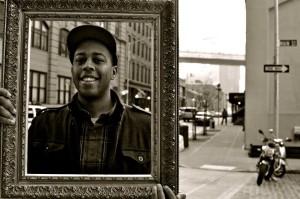 King Williams is filmmaker based in Atlanta and New York City currently working on his debut documentary film on gentrification entitled The Atlanta Way. A finalist for the 2012 Directors Guild of America’s Assistant Director Training Program, Williams is also the creator of Free Film University, a blog dedicated to teaching film and television with instruction from industry veterans. Williams has worked on films for directors Martin Scorsese and Spike Lee as well as for producers Damon Lindelof and Michael Bay.
King Williams is filmmaker based in Atlanta and New York City currently working on his debut documentary film on gentrification entitled The Atlanta Way. A finalist for the 2012 Directors Guild of America’s Assistant Director Training Program, Williams is also the creator of Free Film University, a blog dedicated to teaching film and television with instruction from industry veterans. Williams has worked on films for directors Martin Scorsese and Spike Lee as well as for producers Damon Lindelof and Michael Bay.

